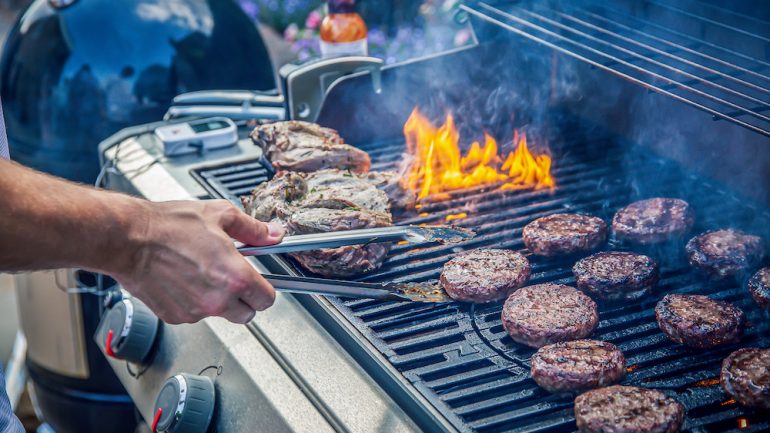Grilling delicious meals on the weekend is therapeutic. You can feel the tensions of the workweek go up in barbeque smoke as you create a chargrilled masterpiece. But to ensure your grilling experience doesn’t flame out, you have to exercise some cooking caution before, during and after you grill. Burned steaks are bad; a burned house is worse. Here’s how to keep the fire inside the grill while having out-of-the-box fun.
Inspecting your gas grill
At the start of grilling season, when your grill has been idle for some time, inspect it for safety issues.
- Examine hoses and connections. Begin your inspection at the valve of the propane tank, move up the supply hose length, and finish your check at the burner connections and the burner jets themselves. Look for cracks, separations and corrosion. You can check for leaks with a cup of soapy water. Open the flow of gas to the grill, then dab a little soapy water on each connection with a toothbrush or paintbrush and watch to see if bubbles form. Bubbles or the smell of gas indicates there’s a leak. Replace any connections or hoses that leak.
- Check for critter habitation. Look to see if birds, mice or wasps have built a nest. There’s no room for squatters in a grill, so If you find cobwebs or nests of mice, wasps or birds, clean them out.
- Make sure your vents operate smoothly. Wearing rubber gloves, use oven cleaner and steel wool to scour away grimy residue that may be gumming up smooth operation.
Inspecting your charcoal or pellet grill
With a charcoal or pellet grill, make sure the firebox is safe before grilling season begins. Inspect inside and out for any breaches in the box, especially at the bottom. These could allow fiery embers to escape and ignite nearby materials. If holes have developed, it’s time for a new grill, or at least a new firebox.
Grill location dos and don’ts
- Do operate your grill outdoors, whether it burns propane gas, charcoal or pellets. Grills that burn fuel emit odorless, deadly carbon monoxide gas, so outdoor ventilation is crucial. Even operating inside an open garage harbors some carbon monoxide.
- Do place a grill on a level stone or brick patio. Your grill will rest easy on that fireproof, level and stable surface.
- Do anchor your grill down. Keep it from tipping or scooting in high wind by placing a weight in its bottom or tying it to the ground.
- Do not operate a charcoal grill on a wooden deck. Hot embers may drop and start a fire or at least scar your deck. Similarly, don’t place a grill on a bed of wood chips or shredded bark mulch.
- Do not place a grill beneath house eaves, an awning, a low-set arbor or tree branches. Keep the spaces above and around the grill clear of combustible material.
Safety while using
- When using a charcoal grill, don’t go wild with starter fluid. There’s no need to drench charcoal for it to light and reach cooking temperature. Follow label directions. Never squirt additional fluid on burning coals. That is explosively dangerous. A safer alternative to lighter fluid is using fire starter pods made of treated wood or compressed newspaper, which are designed to safely start grills and fireplaces. Or use charcoal already treated with starter fluid.
- Stay with your grill while in use. Resist the temptation to set it and forget it. Not only does this make it more likely your food will burn, but emergencies can develop while you are away.
- If a fire starts inside your grill while cooking, first try to suffocate it by closing the lid and vents and, if applicable, turning off the gas. With a charcoal grill, use a fire tool to poke the coals apart in the originating area of the flame. Then close the firebox again. If these measures don’t work, use baking soda as an extinguisher. You can later brush the soda off the food. Never use water on a fire; grease is likely involved, and water will make the flaming grease splatter.
Cleanup and storage
- Let a gas grill cool at least four hours before replacing the cover. Then shut off the valve at the gas tank. With a charcoal grill, wait 36 hours before disposing of charcoal ash and covering the grill. Bury ashes in a flower bed or pit if possible.
- Empty and wash out grease drip trays and cans.
- Remove grates and scrub with warm soapy water, then grease with vegetable cooking oil.
- If you will not be using your grill for an extended period, close all vents to prevent creatures from taking up residence. Disconnect propane tanks and store them separately outside. Cover gas and charcoal grills and pull the drawstring tight.
Related – 5 Fail-Safe Tips to Grill Cleaning


